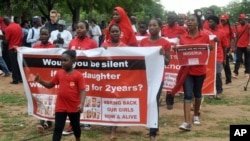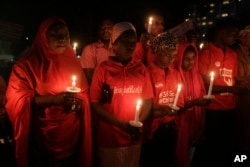Members of the Bring Back Our Girls movement gathered Thursday at Unity Fountain in Nigeria's capital of Abuja amid a heavy police presence.
It has been two years since Boko Haram grabbed 219 schoolgirls from their dormitory in the northeastern Nigerian town of Chibok and herded them away into the night. A new video released Wednesday, on the eve of the anniversary, purports to show 15 of the girls alive as recently as December — and has raised hopes that they can be rescued.
Esther Yakubu is the mother of one of those missing girls.
"It is only God. He is seeing me through and he will see me through,” she said, visibly holding back tears. “And one day I know that with him on that throne, they will be back. It is real. They are the ones in that video. They have changed. Two years ago, they were not like this. But today, they are two years older. I know them. They have changed."
About 300 marchers headed to the State House, chanting “Bring Back Our Girls! Now and Alive!” It’s the same call to action they have issued since they began these demonstrations almost two years ago.
Police blocked the gates to the State House. President Muhammadu Buhari is in China on an official visit, and the group was not able to speak to a representative of his government.
Obiageli Ezekwesili, the founder of Bring Back Our Girls, is confident the girls will be found.
"I am certain that our girls will be back,” Ezekwesili said. “Our girls will be back. There is no evidence to the contrary."
Chibok community leader Hosea Sambidda said if the girls had been the daughters of rich, influential Nigerians, the government would have done more.
"We are here today to strive for the open nerves of humanity, to prick our conscience, to escalate our voices, to speak for the voiceless Chibok girls and many like them still in captivity. For as long as they remain captive, humanity is in captivity," Sambidda said.
Outrage, stagnation
Activists say the previous administration mishandled the kidnapping. The former first lady even questioned publicly whether the kidnapping had actually happened.
But online, the Twitter hashtag #BringBackOurGirls trended globally, sparking international outrage. World leaders met in Paris a month after the girls were kidnapped to rally international resources to defeat Boko Haram.
Two years later, Boko Haram's now seven-year insurgency has killed 20,000 people and spread into three neighboring countries.
When Buhari took office in 2015, he vowed to do everything in his power to find the girls, but said he could make no promises. Repeated attempts to negotiate with Boko Haram have failed.
Nigerian and regional troops now say they have Boko Haram on the run, but none of the missing Chibok girls have been found.





